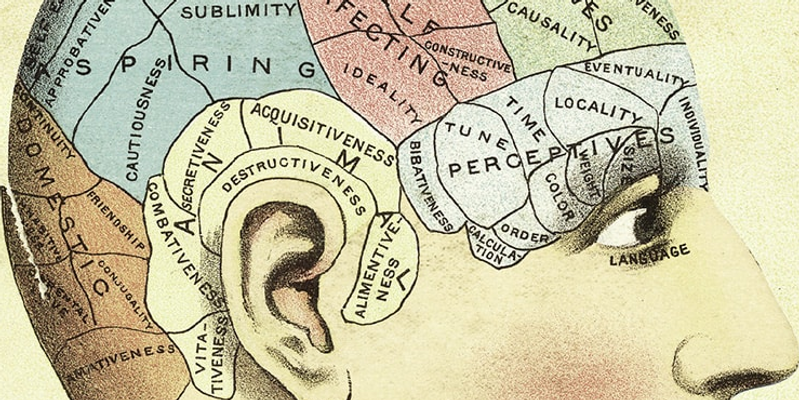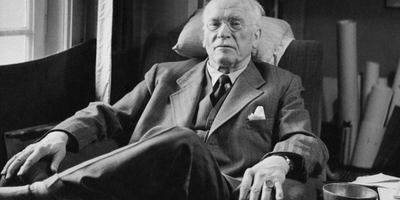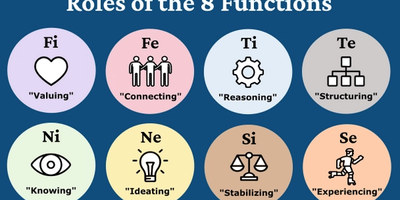Principles of MBTI type theory

Before we start using MBTI to do analysis, we have to establish certain assumptions based on first principles.
Cognitive Functions
The 8 cognitive functions are the building blocks of type theory and make up a person’s conscious and subconscious personality.
Introverted Thinking(Ti)
Introverted thinkers draw conclusions about whether something is True or False based on subjective principles.
In order for them to decide the validity of something based on reasoning from their personal experiences and what they already know to be True, they have to ensure that the new mental model they created to evaluate the new information drawn from their perceiving functions(Ne or Se) aligns with what they already know to be true internally, that everything “fits” into the model.
Therefore, they tend to be slow to come to a conclusion of whether something is True, as they have to spend time making sure all the cause and effect relationships in their mental model are true before accepting something. This also means they are slow at making decisions as they need to ensure that they understand the cause and effect of everything so they can predict the outcome of their decision.
As a result of their lack of speed at coming to conclusions, they are often unsure about many things in the world. Therefore they tend to keep their thoughts private, unless they have done the internal homework to make sure what they say is accurate.
Extraverted Thinking(Te)
Extraverted thinkers draw conclusions about whether something is True or False based on objective empirical evidence.
Te users readily accept facts when they are presented with statistical data or enough respectable sources from the external world.
As they spend little time pondering on the exact causal effects that led to conclusions and assume causal effects even when it may be a simple correlation, they are quick to decide on the validity of something and therefore are quick decision makers.
As a result of their speed of coming to conclusions, they feel certain about many things in the world, and therefore tend to share their thoughts with others. They are also typically better managers and leaders compared to Ti users as they make quick decisions based on the perceived effectiveness of their actions and do not dwell on understanding all possible causal effects before making their decision, as long as the data makes them sufficiently certain that they can reach their desired outcome.
Due to their need of needing empirical results to prove effectiveness of their actions, they often seek to control their environment, creating a system which roots out possible problems to control as many variables as possible to ensure that the casual relation backed up by data is maintained and their actions are effective at achieving their desired outcome.
Introverted Feeling(Fi)
Introverted feelers draw conclusions on how they feel based on subjective values and morals
As Fi users spend much time and effort paying attention to their various emotional responses when met with various situations and then figuring out their core beliefs and identity after much pondering, they view their individual feelings as sacred, therefore they rarely share their feelings, and only do so to those they are the closest to.
As Fi users do not depend on external sources of sentiment to know how they feel and make decisions based on their inner moral compass, they can oftentimes disagree with conventional social norms, and are more likely to fight for social justice against the prevailing beliefs of society.
As Fi users are very aware of their internal emotions, they understand how to generate emotion artificially by imagining certain stimuli, giving them the propensity to be great actors. They also empathize with others via embodied cognition.
Extraverted Feeling(Fe)
Extraverted Feelers draw conclusions on how they feel based on emotional signals from others.
As a result of them absorbing the emotions of others, they try to promote group harmony and avoid conflict in order to feel good themselves by making others feel good.
Extraverted feelers pay attention to body language, tone, and other conscious and unconscious emotional signals from others when interpreting external emotional data. Therefore over time they become better and better at accurately coming to conclusions on how others feel. Therefore they are good at reading social dynamics and can easily manipulate social situations.
As they base their feelings and therefore decisions based on how everyone else feels, their feelings are therefore an aggregate of others’ feelings, hence they are likely to follow the ethics of the majority and tend to subscribe to social norms.
Introverted Intuition(Ni)
Introverted Intuition is a cognitive function which takes in conscious and subconscious data and find an underlying pattern
Due to their ability to develop insights from subconscious and conscious data, those with introverted intuition have almost an uncanny ability to predict the future. as they can extrapolate their insights from current data to guess the unfolding of subsequent events.
They often have a single minded focus on their goal as they trace the pattern to form the best linear path forward
Extraverted Intuition(Ne)
Extraverted Intuition is a cognitive function which takes in data and see numerous possibilities.
Due to their ability to see many paths forward, those with extraverted intuition are usually good creators as they have never ending ideas of new projects or directions they can take when they are creating. They also see possibilities of interconnection between various concepts.
As they are aware of multiple scenarios in which future events will play out, they like to keep their options open and may even be indecisive.
Introverted Sensing(Si)
Introverted Sensing is a perceiving function which pays attention to subjective, internal physical sensations and categorizes them.
As memories are basically made up of the five senses(sight, sound, taste ,touch, smell), an introverted sensor develops a good memory via the process of focusing on such internal physical sensations.
Introverted sensors often feel nostalgic due to them remembering comfortable and pleasurable experiences
Their good memory allows them to compare and contrast new experiences with new ones, evaluating the practicality of ideas based on their past personal experiences of whether similar ideas have worked.
Via the juxtaposition of new experiences with old memories, introverted sensors become naturally detail oriented as they attempt to recall the exact way events played out in the past and compare each specific feature with a current event.
Their focus on physical sensations immediately brings them to the present and to concrete matters, causing them to neglect and dislike abstract theories which they cannot visualize or physically experience clearly.
Extraverted Sensing(Se)
Extraverted Sensing is a perceiving function which pays attention to objective, external sensory information.
Due to more time spent focusing on the sensory inputs coming from the external environment while interacting with the environment, extraverted sensors are attuned to the happenings of the outside world, and can easily manipulate their physical surroundings, making them good at sports, martial arts, camouflage and more.
Due to their aptitude for physical activity, they come to enjoy their freedom and power in the physical world, and thus relish risk-taking activities such as bungee jumping.
Their focus on external sensory information in real time directly implies that they love to live in the moment, not stuck in their heads but instead experiencing the external world to their greatest fulfilment.



